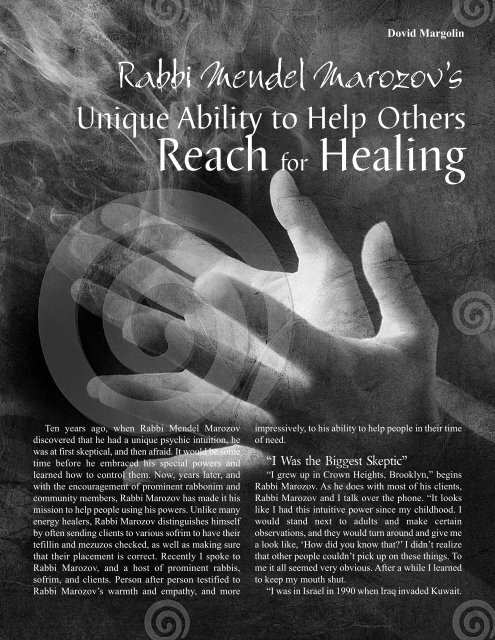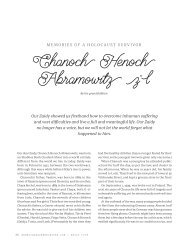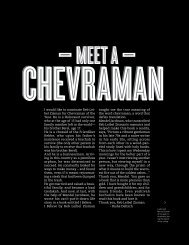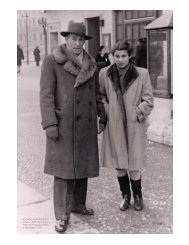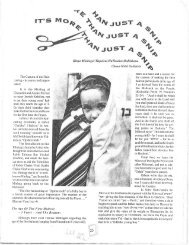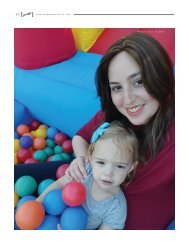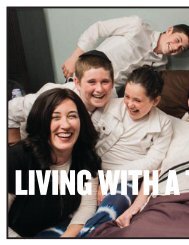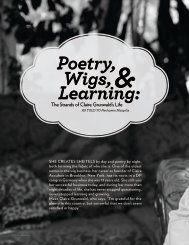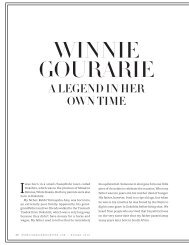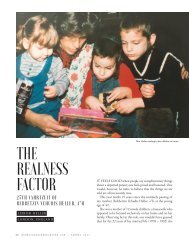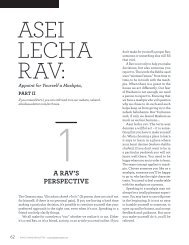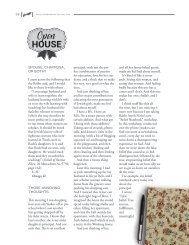Reach for Healing
Rabbi Mendel Marozov's Unique Ability to Help Others, by Dovid Margolin, September 2012
Rabbi Mendel Marozov's Unique Ability to Help Others, by Dovid Margolin, September 2012
You also want an ePaper? Increase the reach of your titles
YUMPU automatically turns print PDFs into web optimized ePapers that Google loves.
Ten years ago, when Rabbi Mendel Marozov<br />
discovered that he had a unique psychic intuition, he<br />
was at first skeptical, and then afraid. It would be some<br />
time be<strong>for</strong>e he embraced his special powers and<br />
learned how to control them. Now, years later, and<br />
with the encouragement of prominent rabbonim and<br />
community members, Rabbi Marozov has made it his<br />
mission to help people using his powers. Unlike many<br />
energy healers, Rabbi Marozov distinguishes himself<br />
by often sending clients to various sofrim to have their<br />
tefillin and mezuzos checked, as well as making sure<br />
that their placement is correct. Recently I spoke to<br />
Rabbi Marozov, and a host of prominent rabbis,<br />
sofrim, and clients. Person after person testified to<br />
Rabbi Marozov’s warmth and empathy, and more<br />
Dovid Margolin<br />
Rabbi Mendel Marozov’s<br />
Unique Ability to Help Others<br />
<strong>Reach</strong> <strong>for</strong><strong>Healing</strong><br />
impressively, to his ability to help people in their time<br />
of need.<br />
“I Was the Biggest Skeptic”<br />
“I grew up in Crown Heights, Brooklyn,” begins<br />
Rabbi Marozov. As he does with most of his clients,<br />
Rabbi Marozov and I talk over the phone. “It looks<br />
like I had this intuitive power since my childhood. I<br />
would stand next to adults and make certain<br />
observations, and they would turn around and give me<br />
a look like, ‘How did you know that?’ I didn’t realize<br />
that other people couldn’t pick up on these things. To<br />
me it all seemed very obvious. After a while I learned<br />
to keep my mouth shut.<br />
“I was in Israel in 1990 when Iraq invaded Kuwait.
I remember at the time telling my wife that I had a<br />
vision of oil wells on fire with smoke billowing from<br />
them. It didn’t make sense because that’s not what an<br />
oil well looks like at all. Seven months later when Iraq<br />
was retreating from Kuwait they lit the oil wells on fire<br />
and that became an iconic image of the Gulf War.<br />
“When I’d be in a large crowd I would sometimes<br />
feel a pain in my leg or my arm, or start feeling<br />
depressed. When I walked away from whomever I was<br />
standing next to, I would start feeling better. I was able<br />
to feel someone else’s physical pain or emotional state,<br />
and it was very confusing <strong>for</strong> me.”<br />
At the same time Rabbi Marozov and his wife were<br />
going through their own personal pain: after years of<br />
marriage they were still childless. They spent many<br />
hard years going through various treatments and<br />
visiting scores of fertility doctors. It would be after<br />
almost 24 years of marriage that they were blessed with<br />
children.<br />
“When I stand next to<br />
someone I will feel their strong<br />
feelings. My subconscious will<br />
pick up on the other person’s<br />
and my outlook will change.”<br />
Rabbi Mendel Marozov speaking with Dovid Margolin.<br />
“We went to doctors in America and in Israel, and it<br />
was the cause of much stress <strong>for</strong> us,” remembers Rabbi<br />
Marozov. “We mostly went to conventional doctors and<br />
did not really do that much alternative medicine. About<br />
ten years ago, three different people, friends of ours,<br />
recommended we try a certain homeopath.”<br />
Homeopathy takes a holistic approach to medicine.<br />
Rather than just focusing on the physical pain afflicting<br />
an individual, a homeopath will take into account the<br />
person’s mental and emotional state as well. Adherents<br />
explain that when a person has a physical problem it is<br />
necessary to view the body as a whole – hence the name<br />
“holistic” – and go to the root of the problem,<br />
something, they explain, that is often emotional rather<br />
than physical. While Rabbi Marozov takes a similar<br />
approach in diagnosing people’s problems, he is not a<br />
homeopath.<br />
“I went together with my wife to this homeopathic<br />
healer and he was asking his questions and mixing his<br />
various remedies. In the middle he asked me to hold a<br />
little vial with a remedy inside and to describe what I<br />
felt. Most people will feel a certain tingle or a small<br />
boost of energy, but when he asked me what I felt I gave<br />
him a very detailed description. He was shocked that I<br />
had felt so much, so he gave me another vial, and then<br />
another. They all look the same on the outside yet each<br />
time I described the different feelings that were<br />
coursing through my body. When he gave me the first<br />
one again (I didn’t know that he<br />
had given it to me again) I<br />
described it almost verbatim the<br />
way I did the first time around. He<br />
was taken aback.<br />
“Then he told me that he has a<br />
pain somewhere on his body and<br />
asked me if I could show him<br />
where it was. I was still very<br />
skeptical but I was curious at the<br />
same time. I put my hands over his<br />
body and after a few minutes I<br />
stopped at his stomach.<br />
“‘That’s exactly where my pain<br />
is,’ said the homeopath. ‘Can you<br />
take it away?’<br />
“I answered him that I could<br />
not because although the pain was<br />
coming from his stomach, its<br />
source was actually at the base of<br />
his neck. ‘You’re right!’ he<br />
exclaimed, ‘I’ve been suffering
from a neck<br />
problem <strong>for</strong><br />
a<br />
while.’<br />
“This whole<br />
time I was playing along, but it was slowly dawning on<br />
me that something was going on. At that same session<br />
with the homeopath he asked me some more questions,<br />
and I was able to describe to him some issues he had in<br />
his own personal life. I could not explain how I was<br />
doing it.<br />
“A short while later I was in Macy’s in Manhattan<br />
with my wife, when I got a phone call. It was this<br />
homeopath and he tells me that he has a woman in<br />
Florida on the line and wants my advice on what<br />
remedy to treat her with. He started naming remedies;<br />
he probably went through seven of them. When he<br />
mentioned one all of a sudden all the lights of<br />
Manhattan grew brighter and my mood became happy.<br />
Then he named another one and it got dimmer. I had a<br />
bad feeling. My mind and body were simulating the<br />
effects each medication would have on this woman. I<br />
gave my advice and we hung up.<br />
The homeopath was in Brooklyn, I<br />
was in Manhattan, and this woman<br />
was in Florida, yet I was able to<br />
feel what would help her.<br />
“I was stunned. To me this was<br />
just so strange, I couldn’t believe<br />
it.”<br />
Rabbi Manis Friedman is a<br />
Shliach and world-renowned<br />
author and lecturer, as well as the<br />
dean of Bais Chana Institute of<br />
Jewish Studies in Minnesota. He<br />
remembers meeting Rabbi<br />
Marozov ten years ago when<br />
Marozov first started to suspect<br />
that he had a special talent. “When<br />
I met Mendel he realized that he<br />
had this power and he was<br />
frightened.<br />
“I’ve met many people be<strong>for</strong>e<br />
who had similar powers. There<br />
was a girl in Bais Chana in the 1970s that would walk<br />
into a room and know what everyone was thinking. In<br />
her case it made her crazy and she hated it. Later she<br />
went with a group to the Rebbe, and she asked the<br />
Rebbe to take this ability away from her. It<br />
disappeared.”<br />
Empathizing With Others<br />
Slowly and discreetly, Rabbi Marozov began to read<br />
books on psychic intuition and energy healing. Because<br />
it is a largely unregulated field, there are many<br />
practitioners who will overstate their powers or make<br />
wholly false claims, causing many to view the field<br />
with suspicion. Rabbi Friedman explains that while the<br />
word “psychic” conjures images of <strong>for</strong>tune telling,<br />
something that is halachically <strong>for</strong>bidden, its real<br />
meaning is to use the mind.<br />
“Psychic healers are basically sensitive people who<br />
can empathize with a person and pick up what hisr pain<br />
is, where it’s coming from, and what might help, often<br />
times better than the person himself.<br />
“Then there is something called ‘remote healing,’<br />
which is not only being able to feel someone’s problem<br />
by tuning into him, but being able to actually send him<br />
a cure from a remote location. Mendel can do these<br />
things. Someone can be in Cali<strong>for</strong>nia and he can sense<br />
what his problem is and send him a cure.”<br />
Rabbi Marozov likens the process of tuning in to<br />
Rabbi Mendel Marozov listens to a client.
another person to the way a radio transmitter and a<br />
receiver work. A transmitter and receiver work by the<br />
creation of an electromagnetic field. When vibrating at<br />
the same frequency the two will connect.<br />
“The human body has its own electromagnetic field.<br />
Your brain uses electricity to send messages through<br />
the nervous system to all parts of the body, and your<br />
body has miles and miles of wiring carrying electric<br />
currents. A person’s electromagnetic pulse carries a lot<br />
of in<strong>for</strong>mation about the individual, such as any trauma<br />
that may have occurred and the like. When I think of<br />
someone, my electromagnetic field will match that<br />
person’s. For me it’s like changing channels. I can make<br />
a conscious decision to tune into someone else.<br />
“When I stand next to someone I will feel his strong<br />
feelings. My subconscious will pick up on the other<br />
person’s and my outlook will change.<br />
“Everyone has this talent to a certain degree, except<br />
some people have it stronger than others. Just as one<br />
person is musical and another is not, some people are<br />
naturally intuitive and others aren’t.”<br />
Rabbi Friedman explains that when Rabbi Marozov<br />
tunes in to someone, he can use his mind to send him<br />
positive energy and help him.<br />
“That’s really the plain meaning of ‘Vos a<br />
chassidishe farbrengen ken uftan, afilu der Malach<br />
Michoel ken nit ufton’ – that which a Chassidic<br />
farbrengen can accomplish cannot be accomplished<br />
even by the Malach Michoel. What can be<br />
accomplished by a group of people gathering together<br />
and thinking positive thoughts about another person can<br />
have a more powerful effect than even Michoel the<br />
angel! It’s not just a cute saying, this is the reality.<br />
Anyone can do it, but Mendel has a special talent <strong>for</strong><br />
it.”<br />
Tefillin and Mezuzos<br />
“One of the Rebbe’s biggest innovations,” explains<br />
Rabbi Friedman, “is to include within the definition of<br />
holistic the health of someone’s tefillin and mezuzos.<br />
Not all psychics can feel this, but Mendel is able to<br />
sense the source of many people’s problems stemming<br />
from an issue with their tefillin and mezuzos, as well<br />
as their placement within the house.<br />
“I was on the phone with Mendel one day, and he<br />
told me, ‘You’re missing a mezuzah on the doorway<br />
over the steps.’ He was in Brooklyn and I was at home<br />
in Minnesota, he has never been to my home, but when<br />
I checked I saw he was right. There was a decorative<br />
pillar on either side of the staircase and it was a tzuras<br />
hapesach – a real doorway, and it required a mezuzah.”<br />
Rabbi Rachamim Ladayov is a Crown Heightsbased<br />
sofer <strong>for</strong> the last 25 years who has seen numerous<br />
cases that Rabbi Marozov has sent to him. Although<br />
Rabbi Marozov does not tell him anybody’s specific<br />
problem, many people have shared with Ladayev their<br />
personal stories.<br />
“Rabbi Marozov once sent me to check the mezuzos<br />
of a couple in Manhattan that he was counseling,” tells<br />
Rabbi Ladayev. “After being married <strong>for</strong> seven years<br />
“I was on the phone with Mendel one day and he told me,<br />
‘You’re missing a mezuzah on the doorway over the steps.’ He was<br />
in Brooklyn and I was at home in Minnesota, he has never been to<br />
my home, but when I checked I saw he was right.”<br />
with no children, they started seeing Rabbi Marozov<br />
and at that point he sent me to their apartment.<br />
“When I got there to look at their mezuzos I<br />
discovered that they were all of very poor quality and<br />
needed to be changed. The husband became very upset<br />
with me and claimed that all I wanted was business. I<br />
answered him that I would go as far as giving him new<br />
mezuzos <strong>for</strong> free as long as he went to any rabbi that he
trusted to compare my mezuzos with his old ones.<br />
“Three weeks later he called me back and admitted<br />
I was right and soon thereafter a check came in the mail<br />
<strong>for</strong> the mezuzos that I gave him. One year later, I didn’t<br />
even remember them, the husband called my house and<br />
in<strong>for</strong>med me in a very excited voice that his wife had<br />
just given birth to two children, Ezra and Yonatan.”<br />
Explains Rabbi Marozov, “I do not see exactly what<br />
the issue with the mezuzah or tefillin is, but I often<br />
sense a problem. Also, there is a very common problem<br />
that many sofrim do not check the batim of tefillin<br />
carefully, and many people do not know how to place<br />
their mezuzos correctly. This can lead to big problems.<br />
“Not long ago I sent someone to a sofer to check<br />
their tefillin. The sofer checked and did not find<br />
anything wrong with either the parshios or with the<br />
batim. When he called me I told him that I did not feel<br />
there was a problem with either of them, but I did feel<br />
something was wrong with their connection and the<br />
sofer should check again. A few days later the sofer<br />
called me up and told me that he checked again and<br />
indeed he found a small piece of sandpaper stuck<br />
behind the parshios in each of the compartments that<br />
hold the parchments.”<br />
Rabbi Friedman tells of a man who was sent by<br />
Rabbi Marozov to have his tefillin checked. After a<br />
sofer checked them twice and found no problem,<br />
Marozov insisted that the tefillin be brought to a second<br />
sofer. After a thorough check a tiny hole was discovered<br />
in the bayis of the tefillin.<br />
“People have to understand that a little crack in a<br />
letter in tefillin can directly correspond to an injured<br />
foot or hand,” says Rabbi Friedman. “However, even if<br />
that is not the source of the problem, at least the person<br />
should daven in kosher tefillin!”<br />
Using His Intuition to Help People<br />
“There are no halachic issues with what Mendel<br />
does,” says Rabbi Manis Friedman. “The Frierdiker<br />
Rebbe writes that ‘Yodea Machshovos – knowing one’s<br />
thoughts’ is a concept found in nature, but that thought<br />
has the added benefit of not being limited by time or<br />
place. That is basically what Mendel does. If he uses<br />
his talent to help people, then he is using it out <strong>for</strong> the<br />
right purposes, and since he learned of his intuitive<br />
powers, he has devoted his life to helping people<br />
through it.”<br />
For Rabbi Marozov, the process of tuning in to<br />
someone else can be a very draining one, leaving him<br />
physically and mentally exhausted after just one half-<br />
hour long consultation. Although there are times when<br />
he can consult with multiple clients in a day, sometimes<br />
he is <strong>for</strong>ced to take the rest of the day off, or even the<br />
next few days off, just to recuperate.<br />
Rabbi Berry Farkash, director of Chabad of the<br />
Central Cascades in Washington State, testifies to the<br />
fact that he, as well as a number of other Shluchim,<br />
have referred people from within their communities to<br />
Rabbi Marozov.<br />
“He’s not a charlatan, and when he consults with<br />
people he does not scare them,” says Rabbi Farkash.<br />
“He advises people with kind words. I have seen many<br />
situations where he has really helped people in a huge<br />
way.”<br />
For Eliezer Zalmanov of Crown Heights, Rabbi<br />
Marozov’s work is not speculation but fact. “I had big<br />
problems with my foot. I cannot say I’m somebody who<br />
believes in these things at first glance, but if I see it I see<br />
it. Rabbi Marozov undoubtedly helped me with my<br />
foot, and you can quote me by name.”<br />
“One benefit with consulting with Mendel<br />
Marozov,” says Rabbi Friedman, “is that when there is<br />
confusion as to what the problem is, Mendel will be<br />
able to go straight to the root of the issue. In many cases<br />
such in<strong>for</strong>mation and help can be vital on the path to<br />
recovery.” n<br />
Rabbi Mendel Marozov is based in Crown Heights and<br />
can be reached at (917) 300-9355, or at<br />
TheHelpingRabbi.com.<br />
Rabbi Mendel Marozov


